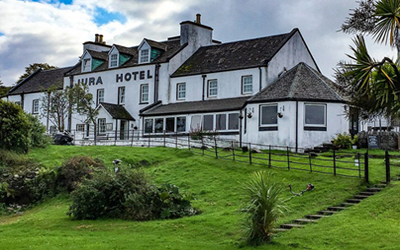Jeremy Malies on Jura: A night in the hotel

Back at Craighouse I scour the hotel for Orwellana which may not be a noun. It should be remembered that not everybody who visits is a diehard fan and Barnhill is a considerable trek. Clueless as to what an aspidistra looks like, I Google it and examine the many pot plants around the lounge but draw a blank. Behind me is a framed illustration of Orwell wearing clothes in Michael Portillo pastel shades. He looks far too gregarious and comfortable in his own skin. The writer was one of those men on whom even classic clothes never hang well, his frame being too rangy. And he sports a bunch of daisies in his buttonhole which is unlikely. Inevitably, there is a tab on the go. The typewriter at which he is pecking is an Olivetti that is at least a decade too modern. Much is wrong but I’m glad he looks so jaunty even rakish.
The reactionary in me is taken aback when a non-resident marches to the bar and asks, with emphasis, what vegan sandwiches are available. Orwell had no truck with vegetarians, fruit-juice drinkers, sandal-wearers, health food shops, and natural medicine quacks. The idea of veganism would have been unfamiliar to him though the word was coined in 1944. I believe I can ventriloquize him here. One of the reasons for being on Jura in the post-war era of rationing – he makes it clear in several letters including the one to Symons quoted earlier – was the quantity of fish, rabbit (and occasionally venison) he could consume in addition to what was available at Craighouse in exchange for his coupons. By way of example, an August 1946 diary entry casually mentions that his dinghy contains no fewer than six dozen lobsters.
A little later, the youthful vegan orders a pint of bitter – and a five-percent Scottish bitter at that! It’s served in a straight glass of which Orwell would disapprove. He argues for glasses with handles when imagining his ideal pub in a whimsical late essay “The Moon Under Water” for The Evening Standard. My hackles come down and I realize that (a good advert for his food regime) this is the cyclist who breezed past me earlier on the track to Barnhill. Wens, who could tempt a Tao contemplative into unburdening himself, engages the man in conversation. He is Spanish, lives in the US and is here with his brother who is a carnivore. They both work in Silicon Valley and are not on Jura for Orwell which is almost refreshing.
At dinner I sit next to two Swiss men who have come over from the adjacent island of Islay which has nine distilleries. I make few claims in terms of knowledge or insight but feel I can intuit when other people understand their subject. These guys are stellar whisky buffs. They take double measures of Jura after their meal and murmur “Too peaty!” It’s a predictable verdict perhaps; even the water in the noisy, always hurrying streams here is of a tobacco colour due to the peat. It should be said that while there is only one distillery, it produces 14 variants so this snap judgement is perhaps unsafe.
A major unOrwellian mistake by Wens and me is to refuse the sticky toffee pudding which is going down well at other tables. Later I learn that Orwell, like his father, was fond of steamed puddings and would make appreciative noises while eating them. I wonder if he ever got to prepare a dish that he discusses in an early diary entry – rabbit stewed with pickled onions. He is welcome to that, just as he is welcome to stag’s liver (he was gifted one) and seaweed cooked in milk to make a blancmange. There was a perversity in his attitude to food. His wife Eileen enjoyed telling the story of how she once went out leaving a shepherd’s pie in the oven for him and eels in a dish on the floor for the cat. Orwell ate the eels.
The highlight of the evening is observing Wens chatting up an improbably younger woman in the hotel lounge with great chivalry. She is gamine, from Brittany, and has a Mia Farrow-ish air complete with cloche hat. Outward fragility is belied by the fact that she is doing many of the islands and will head to Skye tomorrow. Capable of wild camping when necessary, she spent the previous night in a bothy at Glengarrisdale Bay on the northwest of the island where she would have had a view of Mull. Here is Orwell’s diary entry for 7 June 1946: “Fine all day. Walked to Glengarrisdale & back. Exactly three hours each way … Old human skull, with some other bones, lying on the beach … Said to be survivor from massacre of the McCleans (sic) by the Campbells. Two teeth (black) still in it. Quite un-decayed.” The skull has not been seen for decades (it may have washed away from its position on the high-tide mark) but if it were to reappear, I doubt it would faze this intrepid Breton.
The chat-up routine is of interest, even instructive, and I eavesdrop while skimming Lynne Truss’s Eats, Shoots & Leaves which I’ve borrowed overnight from the phone box library. I wonder what Truss would make of Orwell’s pride in not having used a single semi-colon (he considered it an unnecessary stop) in his 1939 novel Coming Up For Air. There were no copies of Nineteen Eighty-Four at the library but there is an edition here, perhaps the most widely printed, a Penguin featuring a painting by Vorticist William Roberts on the cover. The maps that people are consulting in the picture are of the Home Counties, and it’s worth remembering that Nineteen Eighty-Four is set in London. The novel uses many real place names, notably the locations of Winston’s walks and his outdoor trysts with Julia for which she is logistics manager.
On the journey home, I read Sandra Newman’s recent novel Julia which is Nineteen Eighty-Four from Julia’s perspective. It’s metafiction of the highest order and enriches the original. After a stuttering start, even the sex is good for Julia. Despite his missing teeth and varicose vein, Winston looks “piratical”, turns her on and can “ring her like a bell”. The nightmare canteen is memorable, with a menu that includes soup that is “a bean-based swill with a pronounced odour of dog”. I hope that in a parallel universe, Orwell has read the novel and even reviewed it (this was a staple part of his journalism) either using his own voice or in the style of the hack writer he mocks gently in “Confessions of a Book Reviewer”.
In the same parallel universe, I hope he watched a 1954 television adaptation of Nineteen Eighty-Four starring Peter Cushing as Winston. The programme caused outrage and even prompted questions in Parliament. George Orwell, a shipping clerk in south-west London, received so many abusive telephone calls that his wife demanded their phone be disconnected until such time as their name could be removed from the directory.
Only photography could draw Wens away from his new friend and he walks out to the harbour with a camera. There is currently Northern Lights (aurora borealis) mania across the UK on account of geomagnetic storms and good potential for pictures. Orwell saw the lights here in August 1947 and managed to be both pithy and lyrical. “Last night saw the northern lights for the first time. Long streaks of white stuff, like cloud, forming an arc in the sky, & every now & then an extraordinary flickering passage over them, as though a searchlight were playing on them.”



